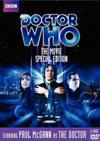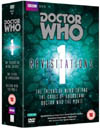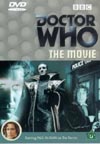DVD Extras now include:
It was with some surprise that the opening "Doctor Who" logo returned to a slightly shinier version of the one from the early Jon Pertwee years.... and because of that the entire line of classic Doctor Who DVD's now sports this logo as well. Weird, but not an entirely objectionable choice. Doctor Who fans have become accustomed to some of the fanciest special-effects-laden single-continuous-shot title sequences on television, and this movie continued the tradition very nicely.
The TARDIS interior is so different in this film, it's almost unrecognizable, and many interior shots went by before I realized where the Doctor was supposed to be at the beginning of the story. It's the iconic hexagonal console that sparks recognition, arguably the best part of this new design. The rest of the "console room" is all a bit too big, too dark, and too similar to a living room for my tastes. A lot of what we see here belongs elsewhere in the maze of rooms and corridors that the TARDIS should have, with white walls and yellow roundels as the common element tying everything together. Of course you'll hire keen new designers eager to leave their mark on the show - so give them alien cities, distant planets, and foreign spaceships that they can go to town on, while leaving the established aesthetic as is. As for the scanner screen, you can't beat a full sized wall screen with the picture keyed in, as we had in seasons 14 through 25... although what we get here is probably more an imitation of the computer monitors built directly into the most recent previous consoles. But laptops and TV's hanging from the ceiling really should be outlawed in TARDIS console rooms, no matter what they're trying to show.
The Original McCoyThe film's biggest claim to legitimacy in the Doctor Who canon is probably the fact that it heavily features Sylvester McCoy's already-established Doctor during the opening act. I must admit that this more than anything else got me immediately on side with the film when I first saw it. McCoy seems to have had more time and more takes to create his performance here, and as a result seems a bit more polished than usual. Is it true that McCoy only agreed to do this movie if his role was of a decent length? It does feel as though a role designed for five minutes was artificially stretched out to about 20....Voiceover narration from Paul McGann during McCoy's segments is actually a good thing, particularly had the plan for this movie as a "backdoor pilot" worked out. New fans getting hooked on a McGann series could then come back to this pilot, and hear their familiar Doctor in the first person identifying himself with the McCoy version of the character. Nice.
Neighbouring DimensionsWith the story being set in San Francisco, yet shot in Vancouver, British Columbia, Canada, it begins to share a similar feel and production style as some of the Fox Network's other 1990's sci-fi shows, namely "Sliders" and "The X-Files", while borrowing some of their recurring guest stars. Michael David Simms can often be seen amongst panels of government officials that Mulder and Scully have to report to, while here he seems keen to create another conspiracy of silence at Grace's hospital. You'll have to be a little more sharp-eyed to spot John Novak behind the surgical mask he is hidden behind during most of his performance, while he plays the surgeon that calls in heart specialist Grace and works closely with her to try to save their patient. Novak plays lawyer Ross J. Kelley on "Sliders", appearing in its pilot episode and its season two opener "Into the Mystic". More deserving of a credit in the opening sequence is actor William Sasso, who is also on hand here receiving a better portion of the camera's focus and injecting considerable humour into this movie with his creative comic timing, as he often did as recurring hotel receptionist Gomez Calhoun across a variety of worlds on seasons one and two of "Sliders". Sasso did a hilarious turn in "Je Souhaite" late in the seventh season of "The X-Files", and more recently recreated the performance of Curly Howard in a remake of "The Three Stooges". Here, Sasso has the distinction of playing the last character to encounter the seventh Doctor, as well as the first to encounter the eighth, and he has a good amount of fun with the opportunity.Most prominent of all in this film is Yee Jee Tso, who also plays the character of "Wing" in "Sliders - The Pilot Episode" and "Fever". Despite his character's questionable background here, Yee Jee Tso quickly makes Lee a character that you easily want to root for, and one whose role and final fate is not so easy to predict as the story unfolds. The TARDIS's first materialization is also unnecessarily confusing.... A different camera angle is called for here, to avoid a misinterpretation of what is happening.
When all is said and done though, the actual scene of regeneration itself is good, and is another highlight of the story.
Third Quarter SuccessIt really is only the third quarter of this film that successfully recreates the atmosphere of adventure that Doctor Who succeeded with in its previous 26 years on television, and gives our protagonists proper challenges to tackle. It is here that our Doctor and companion Grace form a duo and work together to accomplish a goal in the location in which they find themselves, while the Master actually begins to work as an antagonistic force trying to defeat them, and they get to interact with a few guest characters. The goal itself is still quite hokey, but at least this dovetails nicely into the story's angle on the countdown to the New Millennium.Daphne Ashbrook's character of Dr. Grace works well enough as companions go, but probably won't rise too high on any fan's list of favourites from just her first outing here, and it's not likely she'll get a chance at a second outing anymore either. She seems to be most akin to Nicola Bryant's Peri, in terms of the frequency and style with which she gets distracted and flustered, in addition to having a scientific background. Of course, American pronunciation of staple Doctor Who terms heightens this comparison as well. Even though her "work" in the hospital doesn't help make her endearing, I'd still sooner watch continuing adventures with her, with or without romantic involvement, than with the upcoming companion Rose. And it seemed it was a big controversial thing at the time when the Doctor had a certain "flirtation" with his companion, as a great number of loyal fans wanted to stay attached to the impression that this was not something that an alien like him would do. Get over it. The man's had a granddaughter already; it's not like this kind of thing hasn't been implied before. My reaction was much like Sir Ian Chesterton's back in "The Aztecs" (story no. 6). In other words, just chuckle, wink, and say "Congratulations, you old slyboots!" I will admit that I liked another certain tidbit of information that was actually new for this story. I felt it very neatly explains why he is so different in his character and motivations from just about every other Gallifreyan we've ever seen, and also why he ends up involved in more adventures on Earth than anywhere else. Although the continuing show may have decided to ignore this bit, in my mind, it's still true - and may yet come in useful should he need to regenerate more than twelve times.... Eric Roberts has his hands full trying to make his own version of the Master work. As written, his dialogue seems well suited for the elegance and charm of Anthony Ainley's version of the character, or even Roger Delgado's, yet the production team end up giving him more of an Arnold Schwarzenegger / Terminator look, and when this is combined with the American blue-collar background of his paramedic alter-ego Bruce, it's just not the Master as we fans would want to see him again. An even more bizarre question is WHY the production team would try to bring the Master back for this adventure without properly contracting a new actor into the role long-term, or just re-using Anthony Ainley again. If you only intend to use Roberts as a one-off performer for this movie, invent a new one-off villain to challenge the Doctor for Roberts to play, and let him make the role his own. Here the Master truly doesn't get defined in this tale in ways that would match up with his previous appearances. Neither does he get defined in new ways that make much sense to the long-term fan who already knows him. What we really have here is a brand new enemy, with brand new abilities and limitations, and he deserves his own name. That established, Eric Roberts does a good job playing said villain, giving him some good nuances, and a lot of moments of both humour and creepiness.
The Eye of RedundancyThen the rug gets pulled out from under us yet again, and we witness a truly bone-headed concluding act. This final act is also where the script is at its most nonsensical with respect to both actual science and previously established Doctor Who lore. Basically speaking, new viewers are better off getting the classic story "The Deadly Assassin" (story no. 88) first, which is the definitive version of the ideas explored here, plus so much more. McGann's movie's most fundamental flaw is trying to create a central conflict solely by recycling this Doctor Who lore and its devices, threatening to make the show disappear into its own tailpipe.There is also the very ugly flirtation with the idea of the "rewind machine" commonly fantasized about in American science-fiction circles, which is not how Doctor Who operates.... The version here is all done with an excess of cinematic, climactic energy, but little thought. Ultimately, I don't think the audience is pulled along with these ideas, since this conclusion is making up its own pseudo-science and conventions and mechanisms at the last minute, doing whatever it pleases. With all members of the audience, new or old, not really knowing what magical options are possible or not for these characters in this film, the struggle becomes quite ill-defined, and it's hard to feel any cleverness rising from the solutions. And the final moments and situation really do echo those of "The Deadly Assassin" much too closely, without having as convincing a setting to support them.
It does remain an interesting spectacle of what might have been, sporting the unique production values that it does. If anything is to be learned in terms of writing for this show though, I think the movie emphasizes how important it is to base new adventures on new subject matter, instead of disappearing into the lore that's been done before just to get it all wrong and irritate your current fan base, while confusing new audiences to no end.
The Complete Sylvester McCoy Era Story Rankings:(partly just to have something to be able to compare McGann's one adventure to...)
This story is now more widely available on DVD:
Comments on this article are welcome. You may contact the author from this page:
|
||||||||||||||||||||||||||||||||||||||










